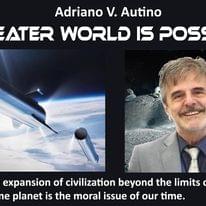
Category: ethics – Page 36


Axon halts plans to make a drone equipped with a Taser
Axon has paused work on a project to build drones equipped with its Tasers. A majority of its artificial intelligence ethics board quit after the plan was announced last week.
Nine of the 12 members said in a resignation letter that, just a few weeks ago, the board voted 8–4 to recommend that Axon shouldn’t move forward with a pilot study for a Taser-equipped drone concept. “In that limited conception, the Taser-equipped drone was to be used only in situations in which it might avoid a police officer using a firearm, thereby potentially saving a life,” the nine board members wrote. They noted Axon might decline to follow that recommendation and were working on a report regarding measures the company should have in place were it to move forward.
The nine individuals said they were blindsided by an announcement from the company last Thursday — nine days after 19 elementary school students and two teachers were killed in a mass shooting in Uvalde, Texas — about starting development of such a drone. It had an aim of “incapacitating an active shooter in less than 60 seconds.” Axon said it “asked the board to re-engage and consider issuing further guidance and feedback on this capability.”
Welcome to DeepMind: Embarking on one of the greatest adventures in scientific history
At DeepMind, we’re embarking on one of the greatest adventures in scientific history. Our mission is to solve intelligence, to advance science and benefit humanity.
To make this possible, we bring together scientists, designers, engineers, ethicists, and more, to research and build safe artificial intelligence systems that can help transform society for the better.
By combining creative thinking with our dedicated, scientific approach, we’re unlocking new ways of solving complex problems and working to develop a more general and capable problem-solving system, known as artificial general intelligence (AGI). Guided by safety and ethics, this invention could help society find answers to some of the most important challenges facing society today.
We regularly partner with academia and nonprofit organisations, and our technologies are used across Google devices by millions of people every day. From solving a 50-year-old grand challenge in biology with AlphaFold and synthesising voices with WaveNet, to mastering complex games with AlphaZero and preserving wildlife in the Serengeti, our novel advances make a positive and lasting impact.
Incredible ideas thrive when diverse people join together. With headquarters in London and research labs in Paris, New York, Montreal, Edmonton, and Mountain View, CA, we’re always looking for great people from all walks of life to join our mission.
#LifeAtDeepMind #artificialintelligence #AGI #socialimpact

Machine Intelligence — A conversation with Robert J. Sawyer, the award winning sci-fi author
Machine intelligence and artificial intelligence. How it may impact the future of humanity — A discussion with award winning science fiction author Robert J. Sawyer.
The exponential growth in computing powers, machine intelligence and artificial intelligence suggests that within a few decades intelligent machines will have more capability than us. How will they interact with humanity and what are the risks?
#booktube #authortube #writingtube #artificialintelligence #futurism.
Robert J. Sawyer’s WWW trilogy of Wake, Watch, and Wonder has just won this year’s Media Award from the Machine Intelligence Foundation for Rights and Ethics (MIFRE), a Washington-state-based non-profit.
The award is given annually for the best fictional representation “of human and machine intelligence forming and thriving in a cooperative peer relationship.”


Call For Papers & Stuff
Closes July 31st at Midnight
The Texas Cyber Summit is a three day multi-track novice to ninja technical cybersecurity event held annually with an expectation of over 1,200 participants in-person. Note that the in-person will take place in September 22nd – 24th, and the Virtual Conference will take place in November 5th. Featuring five dedicated learning tracks for the aspiring Cybersecurity novice to the expert operator. Deeply technical, research and management briefings that address the entire cyber threat landscape. The Texas Cyber Summit is held in Austin, Tx and is a IRS 501C3 Non-Profit Organization.
Austin is home to major fortune 500 companies, Cyber Futures Command, Defense Logistics Agency, and Air force logistics. We host Specialized tracks include teaching, training, responsibilities, and ethics in specialized fields such as digital forensics, Scada, Supply Chain, Red Team Tools, Tactics and Procedures, Blue Team and the Art of Defense, and much more.

Artificial intelligence is already upending geopolitics
The TechCrunch Global Affairs Project examines the increasingly intertwined relationship between the tech sector and global politics.
Geopolitical actors have always used technology to further their goals. Unlike other technologies, artificial intelligence (AI) is far more than a mere tool. We do not want to anthropomorphize AI or suggest that it has intentions of its own. It is not — yet — a moral agent. But it is fast becoming a primary determinant of our collective destiny. We believe that because of AI’s unique characteristics — and its impact on other fields, from biotechnologies to nanotechnologies — it is already threatening the foundations of global peace and security.
The rapid rate of AI technological development, paired with the breadth of new applications (the global AI market size is expected to grow more than ninefold from 2020 to 2028) means AI systems are being widely deployed without sufficient legal oversight or full consideration of their ethical impacts. This gap, often referred to as the pacing problem, has left legislatures and executive branches simply unable to cope.
Could Artificial Intelligence ever Surpass Humans?
The battle between artificial intelligence and human intelligence has been going on for a while not and AI is clearly coming very close to beating humans in many areas as of now. Partially due to improvements in neural network hardware and also improvements in machine learning algorithms. This video goes over whether and how humans could soon be surpassed by artificial general intelligence.
–
TIMESTAMPS:
00:00 Is AGI actually possible?
01:11 What is Artificial General Intelligence?
03:34 What are the problems with AGI?
05:43 The Ethics behind Artificial Intelligence.
08:03 Last Words.
–
#ai #agi #robots
Fmr. Marine Elliot Ackerman: Ukraine Has a Three-to-One Advantage | Amanpour and Company
Elliot Ackerman is following the crisis in Ukraine closely. The author and former U.S. marine served five tours of duty in Iraq and Afghanistan and has just spent two weeks in Kyiv. Ackerman joins Walter Isaacson to discuss Russia’s new tactics and the role of moral resolve in war.
Originally aired on March 30, 2022
For more from Amanpour and Company, including full episodes, click here: https://to.pbs.org/2NBFpjf.
Like Amanpour and Company on Facebook: https://bit.ly/2HNx3EF